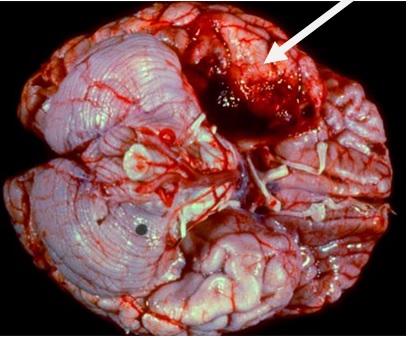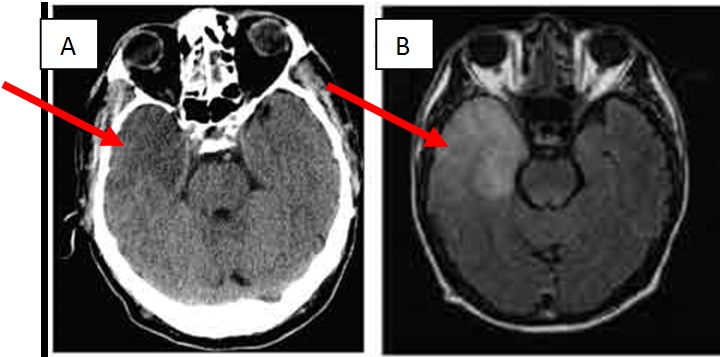Encephalitis (“Encepha” and “litis”) literally means inflammation of the brain. (Figure 1)
It is generally uncommon, affecting about 3.5-7 per 100,000 individuals per year, more commonly in children, elderly and people with weakened immune system.
Majority of the encephalitis is caused by virus. Other causes include
- bacterial infection (such as lyme, tuberculosis)
- over-reaction of immune system towards an infection or even without evidence of infection, leading to abnormal production of antibodies attacking the brain

Figure 1 Brain looking from below : Viral encephalitis – The right brain is red and swollen (white arrow) Source: http://www.cuhk.edu.hk/med/paf/slides/neuropat/x-33.htm
Causes
Many viruses may cause encephalitis. However, having contracted certain viral infection will not necessarily lead to encephalitis.
The viral cause of encephalitis varies according to regions and countries. Hence, your doctor will know the common types of viral encephalitis in your area.
Among the important viral causes of encephalitis in children of this region include:
- herpes simplex virus
- mosquito-borne viruses (Japanese encephalitis virus, dengue virus)
- viruses causing hand-foot-and-mouth diseases (coxsackie virus, enterovirus)
- influenza viruses
- viruses for which childhood vaccines are now available – measles, mumps, rubella, chickenpox, polio
- others – HIV, Rabies,Nipah, cytomegalovirus, Epstein-Barr virus etc
Viruses can cause direct infection of the brain following an acute or latent infection. At times, the inflammation of the brain is secondary to immune response to the viral infection rather than direct infection.
The ways of transmission for the viruses associated with encephalitis
The above viruses can be transmitted via:
- breathing in the airway droplets from an infected person (measles, mumps, rubella, influenza)
- contaminated food or drink (enteroviruses, polio)
- mosquito or tick bites (dengue virus, Japanese encephalitis virus, Lyme)
- bite of an infected animal ( rabies )
- skin contact ( herpes simplex, chickenpox )
Symptoms and signs
Children with viral encephalitis may have some or all the symptoms or signs as below:
- Fever
- Vomiting or poor feeding
- Headache
- Excessive tiredness / sleepiness or difficult to be awakened
- Irritability or inconsolable crying
- Seizures
- Inappropriate or abnormal behavior and mood
- Difficulty in speech or insensible speech
- Loss of ability to perform previously achieved developmental milestones
- Weakness or unsteady walking
- Light sensitivity
- Stiff neck
- Bulging of the soft spot on the top of the head (fontanelle) – in an infant
The presentation of viral encephalitis may be variable according to age group and severity. In mild cases, the presentation may be subtle. On the other hand, the symptoms and signs in younger age group may be non-specific.
Besides, children with viral encephalitis may have the symptoms and signs specific to certain viral infection. For examples: mouth ulcers in herpes simplex and hand-foot-and-mouth infection, cough and runny nose in influenza infection etc. The presentation of encephalitis may develope during or after the acute phase of infection.
Investigations
To identify if a child is having encephalitis, doctor may carry out the following investigations:
- Brain scan ( MRI scan is generally better than CT scan ) – to look for any brain swelling, bleeding and other abnormalities (Figure 2)
- Electroencephalogram or EEG ( test to record the electrical activity in the brain ) – to check for any abnormal brain waves or fits activities
- Lumbar puncture or spinal tap ( test to obtain cerebrospinal fluid or CSF – the fluid surrounding the brain and spinal cord ) – to look for evidence of infection and to identify types of infection
- Other teststo confirm the presence of viral infection – blood test, throat swab or stool test etc

Figure 2 Brain scan (A: CT scan; B: MRI scan) : The abnormal changes over the right brain (red arrow) in herpes encephalitis The image of MRI scan is usually clearer than CT scan.
Source: http://www.consultantlive.com/infections-medicine-journal/herpes-encephalitis-monoclonal-gammopathy
Treatment
If a child is suspected to have encephalitis, he /she will need urgent medical attention and admission for close monitoring.
Some specific medications may be given:
- Acyclovir – medication used to treat herpes encephalitis or chickenpox infection
- The recovery will be better if acyclovir is started early in herpes encephalitis.
- Note: For the other viruses, there is no specific medication.
- Antibiotics ( such as ceftriaxone ) — if bacterial infection of the brain is suspected
The goal of treatment is mainly supportive, which means that the treatment is given to relieve any symptoms or to support any arising complications. For example:
- If a child has fits, medications will be given to control the fits.
- If a child has reduced consciousness with the worry of breathing difficulty, his / her breathing will be supported by breathing machine via a tube in the airway (intubation).
- If there is any brain swelling, doctor will carry out some measures to bring down the pressure in the brain.
Prevention
It is sometimes difficult to prevent viral encephalitis in children. However, something can be done to prevent the viral infection that may lead to encephalitis.
- Immunization – Children should be vaccinated for measles, mumps and rubella as part of the national immunization programme. Chickenpox and Japanese B encephalitis vaccine are also available to reduce the likelihood of contracting these infections.
- Prevention of mosquito bites – Dengue and Japanese B encephalitis viruses are transmitted via mosquito bites. Ways to prevent the mosquito bites include – to remove all possible breeding sites of mosquitoes, to use mosquito repellent, to wear protective clothing (like long sleeves or pants) particularly during dawn or dusk.
Generally, children should avoid contact with anyone who has viral encephalitis. However, as previously mentioned, having contracted certain viral infection will not necessarily lead to encephalitis.
Long-term outcome
The outcome of viral encephalitis is varied. Some children have mild illness with full recovery. However, other cases may be severe leading to permanent impairment or even death.
The permanent brain damage due to viral encephalitis may cause problem in movement and muscle control, hearing and speech, vision, feeding, bladder and bowel control, memory and learning as well as behaviour.
Children with these problems will need long-term rehabilitation such as physiotherapy, occupational therapy, speech therapy etc.
| Last Reviewed | : | 27 September 2016 |
| Writer | : | Dr. Teh Chee Ming |
| Accreditor | : | Dr. Azni b. Yahya |







